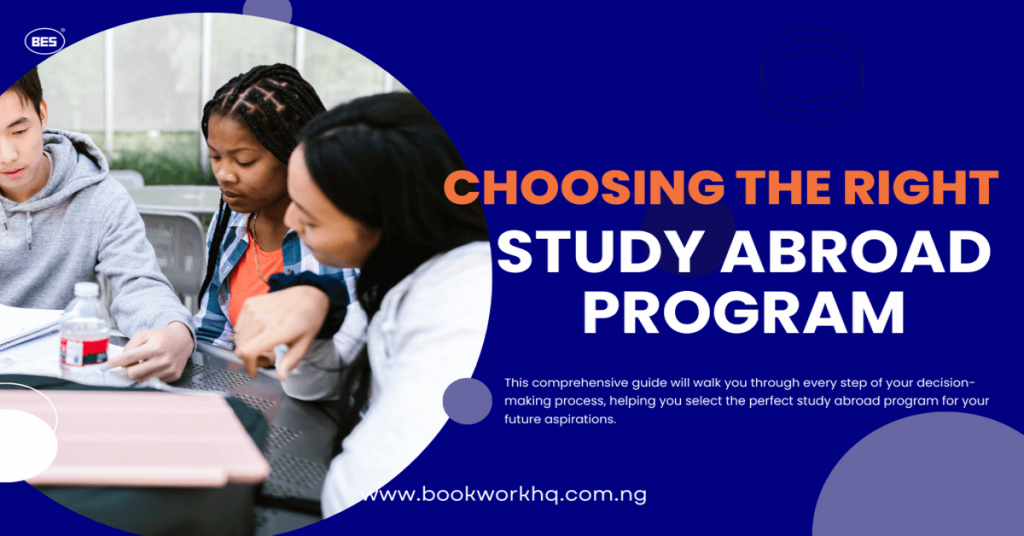Introduction:
Studying abroad is an exciting and enriching experience that can broaden your horizons, boost your career prospects, and help you grow personally and academically. However, the cost of studying in a foreign country can be a significant barrier for many aspiring students. In this comprehensive guide, we’ll explore various ways to secure funding for study abroad programs. Whether you’re dreaming of exploring ancient ruins in Greece or conducting research in Tokyo, we’ve got you covered. Plus, we’ll provide links to external resources and related posts to ensure you have all the information you need.
1. Scholarships and Grants

Scholarships and grants are among the most sought-after sources of funding for study abroad. They are excellent options to cover your study abroad expenses. They are typically awarded based on academic merit, financial need, or specific criteria They can significantly reduce the financial burden. Here are some places to start your search:
- Government Scholarships: Many governments offer scholarships to international students. Check with your home country’s government for opportunities.
- University Scholarships: Most universities have their own scholarships and grants. These can be merit-based or need-based.
- Private Organizations: Numerous private organizations and foundations provide scholarships for study abroad. Websites like Fastweb and Scholarship.com can help you find them.
Here are some application tips to help you secure a scholarship:
Start Early: Most scholarship applications have strict deadlines, so begin your search and application process well in advance.
Read Eligibility Requirements: Carefully review the eligibility criteria for each scholarship to ensure you meet the qualifications.
Prepare a Strong Application: Craft compelling essays and gather any required documents like transcripts, letters of recommendation, and a well-structured resume.
Follow Instructions: Pay close attention to application instructions and ensure you submit all required materials correctly.
Apply for Multiple Scholarships: Apply to as many scholarships as you qualify for to increase your chances of receiving financial aid.
Specialized Scholarships: Explore specialized scholarships that cater to unique interests, backgrounds, or study areas. Some examples include scholarships for women in STEM fields, scholarships for LGBTQ+ students, and scholarships for underrepresented minorities.
Study Abroad Program Scholarships: Many study abroad programs offer their own scholarships or financial aid packages. When researching study abroad programs, inquire about any scholarships or grants they may have available. These are often specific to the program’s location or focus.
Stay Updated: Scholarship opportunities change regularly, so continue to check for new opportunities throughout your academic journey.
Remember that scholarships and grants are highly competitive, so it’s essential to put your best foot forward when applying. Tailor your applications to the specific requirements of each scholarship, highlighting your achievements, aspirations, and the impact the scholarship will have on your study abroad experience. By diligently researching and applying for scholarships and grants, you can significantly reduce the financial burden of studying abroad and make your dreams of international education a reality.
2. Financial Aid and Students Loans

Financial aid and student loans are common avenues for funding higher education, including study abroad programs. Many governments offer financial support to students pursuing international education. While they come with certain responsibilities, they can provide the financial support you need to make your international education dreams a reality. Research the programs available in your home country and the country you plan to study in.
Here’s how to navigate these options:
- Explore Financial Aid Options: Start by investigating the financial aid options available to you through your home institution. This may include federal or state financial aid programs, grants, and scholarships.
- FAFSA (Free Application for Federal Student Aid): If you’re a U.S. student, the FAFSA is a critical step in accessing federal financial aid. Complete it as early as possible to determine your eligibility for grants, loans, and work-study opportunities.
- Federal and Private Student Loans: Student loans can be used to cover study abroad expenses, but it’s important to understand the terms and obligations associated with borrowing:
Federal Student Aid: Federal loans often have more favorable interest rates and repayment terms than private loans. Explore federal loan options, such as Direct Subsidized Loans and Direct Unsubsidized Loans. Private Students Loans: If you need additional funding beyond federal loans, research private student loan options. Compare interest rates, repayment plans, and terms from different lenders to find the best fit for your needs.
- Loan Repayment Considerations: Before taking out loans, create a realistic plan for repaying them. Understand the expected monthly payments and how they fit into your post-graduation financial picture.
- Loan Forgiveness Programs: Explore loan forgiveness programs that may be available to you based on your career choice and other factors. For example, some federal loans can be forgiven if you work in public service or certain nonprofit organizations.
- Financial Counseling: Seek financial counseling or guidance from your university’s financial aid office. They can help you make informed decisions about borrowing and managing your finances during and after your study abroad experience.
- Budget Wisely: Regardless of whether you use loans or financial aid, maintain a detailed budget throughout your study abroad journey. Track your spending and ensure that you are staying within your means to avoid excessive debt.
- Post-Graduation Plans: Consider how your study abroad experience aligns with your career goals. Make strategic decisions about your course of study and program selection to maximize the return on your investment.
Financial aid and student loans can provide essential support for your study abroad adventure, but they also come with long-term financial responsibilities. It’s crucial to approach these options with careful consideration, understanding the terms and repayment requirements, and ensuring that your financial plan is sustainable in the long run. Make use of resources and guidance available through your university’s financial aid office to make informed choices.
3. Work While Studying

Working part-time while studying abroad can help you cover living expenses and gain valuable international experience. Look for jobs on or off-campus. Many universities also have on-campus jobs available to international students. Ensure you understand your visa restrictions and work regulations in your host country. Here’s how to make the most of this option:
- Visa Regulations: Start by researching the visa regulations in your host country. Some countries allow international students to work while studying, while others have restrictions. Ensure you comply with all legal requirements.
- Work Opportunities: Explore job opportunities available to international students. Common options include on-campus jobs, part-time positions in the local community, or internships related to your field of study.
- On-Campus Jobs: Many universities have on-campus employment opportunities available to international students. These jobs may include positions in the library, student center, or administrative offices.
- Local Job Market: Research the local job market in your host city. Some areas may have a high demand for part-time workers in specific industries, such as hospitality, retail, or food service.
- Internships: If your study abroad program allows for it, consider applying for internships in your field of study. Internships can not only provide income but also enhance your resume and give you a taste of the local work culture.
- Work-Study Programs: Some countries have work-study programs that allow international students to work on or off-campus to support their studies. These programs often have partnerships with local businesses.
- Language Requirements: Depending on the job or internship you seek, language proficiency may be required. If you’re not fluent in the local language, consider taking language courses to improve your communication skills.
- Balance Work and Studies: While working part-time or interning, it’s crucial to maintain a balance between your work commitments and academic responsibilities. Be sure that your work hours do not interfere with your coursework.
- Networking: Building a network in your host country can lead to valuable job opportunities. Attend networking events, engage with local professionals, and connect with your professors and classmates.
- Financial Planning: Keep track of your earnings and expenses. Create a budget to ensure that your part-time income covers your living expenses and contributes to your education fund.
- Resume Building: Highlight your international work experience on your resume when you return home. Employers often value candidates who have gained global perspectives and adaptability through international work experiences.
- Tax Considerations: Be aware of any tax obligations associated with working abroad. Some countries have tax treaties in place to avoid double taxation, while others may require you to file tax returns in both your home country and the host country.
While working part-time or interning during your study abroad experience can be a rewarding way to finance your education, it’s essential to prioritize your academic goals and ensure that your employment does not overwhelm your studies. With careful planning and dedication, you can strike a balance between work and education while enjoying a memorable international experience.
4.University and Program-Specific Scholarships:

Many universities and study abroad programs offer their own scholarships and financial aid options tailored to students seeking international education. These scholarships can be valuable because they are often designed to support specific academic pursuits, destinations, or programs. Here’s how to make the most of these opportunities:
- Visit the University’s Financial Aid Office: As a first step, visit your university’s financial aid office or study abroad office. They can provide you with information on scholarships available directly through your institution. These scholarships may be specific to your major, department, or even your academic performance.
- Explore Study Abroad Program Scholarships: If you have already chosen a study abroad program, inquire about any scholarships they offer. Many programs allocate funds to support their participants. These scholarships might be tied to the program’s location, academic focus, or cultural immersion opportunities.
- Check Eligibility Criteria: Each university or program may have its own set of eligibility criteria for scholarships. Some may prioritize academic achievement, while others may consider financial need, diversity, or participation in extracurricular activities.
- Application Process: Understand the application process for university and program-specific scholarships. This may include submitting essays, letters of recommendation, transcripts, and other supporting documents. Pay close attention to deadlines.
- Faculty Recommendations: Don’t hesitate to reach out to faculty members in your department or professors who may be knowledgeable about the scholarship opportunities available for your chosen field of study. They can often provide guidance and recommend scholarships that align with your academic interests.
- Program-Specific Requirements: Some study abroad programs may require you to write essays or proposals explaining why you want to participate in their program and how their scholarship will benefit your academic and personal development.
- International Exchange Partnerships: If your university has international exchange partnerships with other institutions, these partnerships can sometimes include scholarship opportunities. These programs often allow students to study at partner universities while paying tuition at their home institution.
- Application Tips: When applying for university or program-specific scholarships, customize your applications to highlight your alignment with the program’s values, goals, and academic offerings. Address how the scholarship will enable you to contribute to the program’s mission and enhance your academic journey.
- Follow Up: If you submit an application for a scholarship, be sure to follow up with the relevant department or office to confirm that your application was received and inquire about the timeline for announcements.
University and program-specific scholarships can be a great way to secure financial support for your study abroad adventure while also aligning your educational goals with the values and missions of the institutions and programs you choose. Remember that these scholarships are often less competitive than national or international scholarships, making them an excellent avenue to explore.
5. Crowdfunding and Fundraising

Crowdfunding and fundraising are creative ways to raise funds for your study abroad program. These methods leverage the power of your network and online platforms to collect contributions from friends, family, and even strangers who believe in your educational journey. Here’s how to effectively use crowdfunding and fundraising for your study abroad expenses:
- Choose a Crowdfunding Platform: Start by selecting a crowdfunding platform that aligns with your goals. Platforms like GoFundMe, Kickstarter, and Indiegogo are popular choices. Each platform has its own set of features and fees, so read the terms carefully.
- Create a Compelling Campaign: Your crowdfunding campaign should tell a compelling story about your study abroad aspirations. Explain why this experience is essential to your personal and academic growth, and how contributions will make a difference.
- Set Clear Goals: Be transparent about the amount of money you need to raise. Break down your expenses, including tuition, travel, accommodation, and living costs. Potential donors are more likely to contribute when they understand where their money is going.
- Engage Your Network: Share your campaign with friends, family, and social media connections. Encourage them to share it with their networks as well. Personalize your outreach by explaining how their support will impact your life.
- Offer Perks: Some crowdfunding platforms allow you to offer perks or rewards to donors. Consider providing thank-you notes, souvenirs from your host country, or updates about your journey to incentivize contributions.
- Regular Updates: Keep your supporters engaged by posting regular updates on your campaign page. Share your progress, express gratitude, and showcase how their contributions are helping you achieve your goals.
- Share Your Story: Craft a compelling narrative about your study abroad experience and why it matters to you. Share anecdotes, photos, and videos to make your campaign more relatable and engaging.
- Offline Fundraising: In addition to online crowdfunding, explore offline fundraising opportunities. Organize events, such as bake sales, garage sales, or community fundraisers, to raise funds within your local community.
- Leverage Your Talents: If you have a particular talent or skill, consider offering services or products in exchange for donations. For example, you could give music lessons, create custom artwork, or offer tutoring sessions.
- Thank Your Supporters: Express your gratitude to every supporter, regardless of the donation amount. Personalized thank-you notes or emails can go a long way in building and maintaining relationships.
- Be Transparent: Keep your supporters informed about your study abroad plans, challenges, and successes. Transparency fosters trust and encourages ongoing support.
Crowdfunding and fundraising require effort and persistence, but they can be incredibly effective in generating financial support for your study abroad dreams. Remember that success in these endeavors often depends on your ability to connect with your audience emotionally and effectively convey the value of your educational journey.
6. Employer Sponsorship

Employer sponsorship is an often overlooked but valuable source of financial support for study abroad programs. If you’re already working, or if you plan to work while studying abroad, inquire whether your employer offers sponsorship or scholarships or financial assistance for further education. They may see it as an investment in your professional development. Here’s how to navigate this option effectively:
- Research Your Employer’s Policies: Start by reviewing your employer’s policies and benefits package. Some companies have established programs to support employees’ educational endeavors, including study abroad.
- Engage in a Conversation: Initiate a conversation with your supervisor or human resources department to express your interest in studying abroad and inquire about any existing sponsorship programs. Be prepared to explain how your study abroad experience will benefit both you and the company.
- Articulate the Benefits: Clearly communicate the advantages of sponsoring your study abroad program to your employer. Highlight how the skills and knowledge you gain will be an asset to your current role and the company as a whole.
- Negotiate Terms: If your employer is open to sponsorship, work together to establish the terms and conditions of the arrangement. This may include commitments such as returning to work after completing your studies or fulfilling a certain tenure with the company post-graduation.
- Educational Leave: In some cases, employers may offer educational leave, allowing you to take a temporary break from work to pursue your study abroad program. Explore this option if it aligns with your career goals.
- Tuition Reimbursement: If your study abroad program includes tuition costs, inquire whether your employer offers tuition reimbursement programs. This can help cover a significant portion of your educational expenses.
- Contract Agreements: Be sure to document any agreements or contracts related to employer sponsorship. These documents should outline the financial terms, expectations, and any conditions associated with the sponsorship.
- Maintain Professionalism: Throughout your study abroad experience, maintain professionalism and stay in communication with your employer. Share updates on your progress and experiences, demonstrating your commitment to your role and the organization.
- Return to Work Commitment: If your employer expects you to return to work after your study abroad program, ensure that you fulfill this commitment. Leveraging the knowledge and skills you acquired during your international experience can be mutually beneficial for both you and your employer.
- Express Gratitude: Show appreciation to your employer for their support and investment in your education. A thankful and professional attitude can leave a positive impression and potentially open doors for future opportunities within the company.
Employer sponsorship not only provides financial support for your study abroad program but also showcases your dedication to personal and professional growth. It can be a win-win situation, where you gain valuable skills and experiences while contributing positively to your employer’s objectives. Be proactive in exploring this option and leverage it to advance your career and educational goals.
7. Cultural and Language Exchange Programs

Some organizations offer cultural and language exchange programs that provide financial support or stipends in exchange for your participation. Study abroad exchange programs offer an excellent opportunity to reduce the overall cost of your international education. These programs often come with tuition waivers, reduced fees, and sometimes even stipends, making them a financially attractive option. Here’s how to make the most of study abroad exchange programs:
- Understand the Concept: Study abroad exchange programs involve partnerships between your home institution and a foreign university. These partnerships allow you to study at the foreign university while paying tuition at your home institution. This can result in significant cost savings.
- Check University Partnerships: Begin by checking if your university has established partnerships with institutions abroad. These partnerships are the foundation of exchange programs. You can typically find information about exchange opportunities on your university’s study abroad or international programs website.
- Explore Eligibility: Each exchange program may have different eligibility criteria. These criteria can include academic performance, language proficiency, and the availability of spots in the program. Consult with your university’s study abroad office to determine your eligibility.
- Consult Advisors: Seek advice from academic advisors, study abroad advisors, and professors who may have insights into exchange programs related to your field of study. They can provide guidance on the best-fit options for your academic and career goals.
- Financial Benefits: Exchange programs often come with financial benefits such as waived or reduced tuition fees. Additionally, you may have access to housing options, stipends, or other financial incentives.
- Academic Planning: Plan your courses carefully to ensure that the classes you take abroad align with your academic requirements and degree progress. Work with academic advisors to create a study plan that integrates seamlessly with your home university curriculum.
- Language Preparation: If the host country uses a language other than your native language for instruction, consider taking language courses or language immersion programs to prepare for the language requirements of the exchange program.
- Apply Early: Exchange programs are competitive, and spaces can be limited. Apply early to secure your spot and have ample time to prepare for your study abroad experience.
- Immerse Yourself: Embrace the opportunity to immerse yourself in the local culture, meet new people, and explore the host country. Take advantage of cultural exchange events and activities organized by the host institution.
- Document the Experience: Keep a journal, take photos, and document your experiences throughout your study abroad journey. These memories will not only enrich your personal growth but also serve as valuable additions to your resume.
- Stay Connected: Maintain communication with your home university while abroad. Share your experiences and insights with fellow students who may be interested in exchange programs in the future.
Study abroad exchange programs are a cost-effective way to experience international education while continuing to progress toward your degree. They provide the opportunity to immerse yourself in a new culture, make global connections, and gain a unique academic perspective. Be proactive in exploring exchange opportunities and seize the chance to broaden your horizons through this valuable experience.
Other Funding Methods include:
- Study Abroad Organizations: Many study abroad organizations, like AFS and Rotary International, offer scholarships and financial assistance to students interested in their programs.
- Travel Grants and Awards: Travel-related companies, such as airlines and travel agencies, sometimes offer grants and awards for students studying abroad.
- Teaching or Research Assistantships: Some universities offer teaching or research assistantships for graduate students. These positions often come with a stipend and tuition waivers. Check with your department or faculty.
Conclusion:
Securing funding for a study abroad program may seem challenging, but with determination and research, you can make your dream a reality. Explore all available options, and don’t hesitate to seek advice from your university’s financial aid office or study abroad advisors. Remember to bookmark this page for future reference and check out our social media profiles for more tips and resources on studying abroad.
For additional information, check out our related blog posts:
Follow us on Facebook, Instagram and LinkedIn for updates and engaging content on studying abroad. We’re here to support you in your academic and personal pursuits.
Do you have more questions or need further assistance with your study abroad plans? Feel free to contact us, and we’ll be happy to help you on your journey!



Pingback: What is proof of funds? · Bookworm Educational